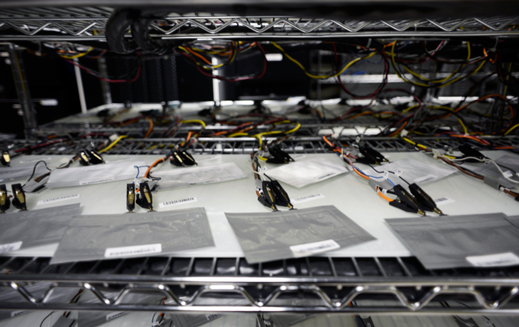A Breakthrough Battery Gets a Big Backer
A lithium-ion battery that stores twice as much energy is a step closer to commercialization thanks to a deal with the U.K. home appliance company Dyson.

The startup Sakti3 announced today that it has signed a joint development agreement with Dyson, which makes vacuum cleaners and other appliances, to incorporate its batteries into new products. The companies didn’t say when those products will be available, but one could be a cordless vacuum cleaner. Dyson also announced a $15 million investment in the startup.
Sakti3 uses new materials and manufacturing techniques to achieve higher energy density. The company’s battery does away with the flammable liquid electrolyte used in conventional lithium-ion batteries, which makes it feasible to use a different set of high-energy storage materials (see “Solid-State Batteries” and “A Battery for Electronics That Lasts Twice as Long”).
The technology could have many applications, including electric vehicles, the range of which is limited by the size and cost of conventional batteries.
In a statement, Dyson founder and chief engineer James Dyson said, “Sakti3 has achieved leaps in performance which current battery technology simply can’t.”
Many battery startups have struggled to translate impressive lab results into products (see “Why We Don’t Have Battery Breakthroughs”), in part because their prototypes are custom-made, often using expensive manufacturing techniques that can’t easily be scaled up. Sakti3 makes its prototypes on standard manufacturing equipment, and this could help ensure that the technology, once perfected, can be commercialized.
Success isn’t a sure thing. Making a few prototypes might not translate to high yields in a factory, where conditions and raw materials can vary. But the partnership with Dyson, which has manufacturing experience and relatively deep pockets, could make the transition easier for Sakti3.
Keep Reading
Most Popular
Large language models can do jaw-dropping things. But nobody knows exactly why.
And that's a problem. Figuring it out is one of the biggest scientific puzzles of our time and a crucial step towards controlling more powerful future models.
How scientists traced a mysterious covid case back to six toilets
When wastewater surveillance turns into a hunt for a single infected individual, the ethics get tricky.
The problem with plug-in hybrids? Their drivers.
Plug-in hybrids are often sold as a transition to EVs, but new data from Europe shows we’re still underestimating the emissions they produce.
Google DeepMind’s new generative model makes Super Mario–like games from scratch
Genie learns how to control games by watching hours and hours of video. It could help train next-gen robots too.
Stay connected
Get the latest updates from
MIT Technology Review
Discover special offers, top stories, upcoming events, and more.